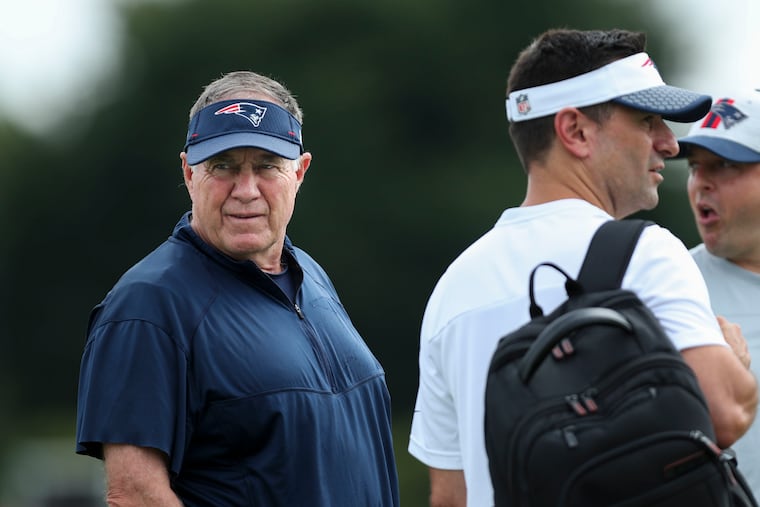Bill Belichick was more than the best coach in NFL history. He was the Eagles’ model and greatest rival.
Whatever the Eagles had done or tried to do as a cutting-edge franchise, Belichick and the Patriots did first or better.

The only head coach to lose to the Eagles in a Super Bowl is, for the moment, no longer an NFL head coach, and the thing that everyone around here forgets is that the Eagles wouldn’t have won that night without Bill Belichick.
He and the Patriots are, in the parlance of our times, “parting ways” after 24 years. And his departure from New England on Thursday marks not only the end of the most successful tenure of any coach in the history of professional football, but also the end of the most feared and influential rival that the Eagles have ever had.
The Cowboys have generated more resentment. The Giants have produced more memorable moments. But the Patriots, under Belichick, were more than an opponent that the Eagles and their fans desperately wanted to beat. They were the model for the franchise that Jeffrey Lurie and the Eagles wanted to be and still strive to be — and, for that one February night in Minneapolis, were.
A bold and ruthless mind
Think about it: The Eagles’ two most important offensive plays in Super Bowl LII came on fourth downs: Trey Burton’s touchdown pass to Nick Foles, and Foles’ drive-extending completion to Zach Ertz late in the fourth quarter. Doug Pederson, Frank Reich, and the Eagles’ analytics department had spent that 2017-18 season demonstrating that a more daring approach to fourth-and-short situations was smart football, and their aggressiveness had paid off in the biggest of games.
But Belichick had been the boldest gambler of the bunch. He had crashed through that wall first. In 2009, rather than willingly give the ball back to Peyton Manning late in the fourth quarter of a game against the Colts, he risked the wrath of second-guessers and football traditionalists everywhere.
With the Patriots up six, he had Tom Brady and the New England offense go for it on fourth-and-2 from their own 28-yard line. The play failed, and the Patriots lost the game, but Belichick’s decision in time came to be seen not as reckless but as intelligent. The numbers backed him up.
“We thought we could win the game with that play,” he said afterward. There is no Philly Special, no Tush Push, without Belichick showing the way.
Think about it: While Joe Banner was showing NFL executives the best way to negotiate the league’s salary cap — don’t pay players for who they have been; take the calculated risk to pay them for who you hope they will be — Belichick was doing the same thing in New England. It became a cliched phrase to describe Belichick’s ruthlessness: He’d rather get rid of a guy too early than too late. Six Super Bowl victories later, one of them at the Eagles’ expense, it was clear he was right to be so ruthless.
Think about it: The Eagles deserve credit for reaching the Super Bowl last season so soon after making the grave mistake of misjudging Carson Wentz.
Once it went bad between them and Wentz, the Eagles didn’t say to themselves, We handpicked him to be our franchise quarterback, and we just signed him to a four-year extension that could be worth up to $128 million. That’s a huge financial and philosophical commitment. If we trade him, it’s going to cripple us vis-a-vis the salary cap. We don’t have a choice. We need to make this work. Nope. They saw Wentz’s contract for what it was — a sunk cost — and did what they had to do.
They moved on from him, made his backup their starter, and managed to keep winning with Jalen Hurts and without Wentz.
Think about it: The Eagles are amateurs in this regard compared to Belichick. Everyone remembers how the Patriots began their transformation into a dynasty the moment, in September 2001, that Drew Bledsoe took that hellacious sideline hit from Jets linebacker Mo Lewis and Brady took over for him. Brady, after all, has since proved to be an immortal, the greatest player at the most important position in the most popular American sport.
What everyone forgets is how gutsy Belichick’s decision to stick with Brady was. Just six months earlier, in March ‘01, Bledsoe had signed a 10-year, $103 million extension with the Patriots — the largest contract, at the time, in NFL history. Patriots owner Robert Kraft adored Bledsoe as a player and a person, yet there was Belichick, telling his boss that no, the backup that they’d drafted in the sixth round the year before was better than the best quarterback the Patriots had ever had.
The model
A native Bostonian himself, Lurie has never hid his admiration for the Patriots, but his appreciation for and emulation of them hasn’t been about hometown nostalgia as much as the way they established and maintained such a high standard of excellence for so long.
For so much of Lurie’s three decades in charge of the Eagles, they have been chasing one franchise, one team, one fabulous football mind. Whatever they have tried to accomplish as a forward-thinking, cutting-edge NFL organization, Belichick and the Patriots did first or better.
They caught up to him, finally and for the only time, that night in Minneapolis six years ago. Funny. They never would have been in the race without him.